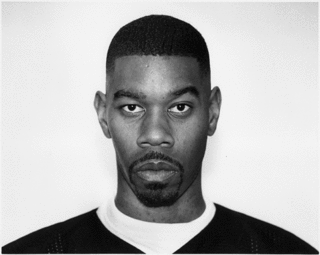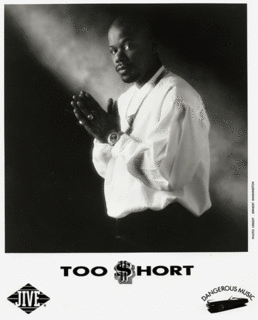Profile by Billy Jam...
This profile originally appeared in the May 1995 issue of No Joke newsletter.
"I got White girl for sale." For some reason I can't get that line from E-40's "It's All Bad" out of my head. Actually, that's just one of the many, many hooks or rhymes from E-40's incredible In A Major Way album that's stuck in my brain. You know, the ones you wake up humming. And I sure ain't the only one who's all into E-40 these days. No way 'cause suddenly our man, the Mailman, is on every cover of every goddamn magazine you pick up, from the expected rap mags-both local and national-to mainstream weeklies and dailies. E "fuckin'" 40 the man has truly arrived. His album shot to the top of the charts and everyone's into him now that they've adjusted their ears to his unique vocal delivery. At parties from Oakland to Atlanta when DJ's throw on "Captain Save A Hoe" with it's infectious singalong chorus of "I wanna be saved" the frenzied crowd will react with the same enthusiasm as they would to any true classic.
And besides the music being hittin', E-40 is amazing in another way. In a major way, if you will. And that is that he's a role model of true independence. He stuck to rap even though everyone told him that his "wierd" style of rapping sucked. He, along with The Click family (Suga-T, D-Shot and B-Legit), proved himself locally and then nationally. He sold a ton of records independently and made a shitload of money for himself because when you do it independently like many other Bay Area rappers such as JT The Bigga Figga do, you keep most of the money for yourself. Not like so many unfortunate rappers who immediately go major, but are broke, sad and forgotten just a year later.
Not E-40 though. He was selling so many tapes and making so much money on his own independent Sick Wid' It Records label that it got the dollar envy flowing in the veins of many at the big labels. They all wanted a piece of the pie. "Yo 40, let me fly you to LA. We need to talk about what kind of deal would make you happy." The deal that he eventually got was the much publicized 3.5 million dollar deal from Jive Records, except that this is actually not the real figure he got. Read below for the truth.
E-40 has arrived. He shot to the top on his own terms. He is truly a role model for bravely looking countless obstacles in the eye and beating them all.
The first obstacle of course that he faced was a very major one. Everyone said, "You suck," and as with any musical innovator, it's just plain hard to get accepted at first. E-40's offbeat, syncopated style, where he raps with rapid fire delivery, led to disgruntled comments like, "He sounds like a robot" or "Just give it up." Jo Treggiari was with the Oakland based one-stop, The Music People, in 1990 when the first Click tape, the four song Let's Side, dropped. "We dug it, but we were about the only ones. His flow was so unusual that most people thought it was wack, but really he was ahead of his time," she recalls.
To all this E-40 just shrugged his shoulders and decided to go directly to the rap fans themselves and let them decide if he was wack. So wherever E-40 and The Click went they'd pass out their tapes. "Even if we were in Reno or Vegas for the weekend we'd pass out tapes" he told me, adding that "We'd see a dude we gave a tape to a week earlier and he'd be like, 'Hey dude, that shit was on hit. I ain't even gonna bark at you.'" From 1990 to 1994, E-40 and The Click kicked ass recording and touring to places such as Detroit and Houston. Then last year, 40 hooked up that infamous deal on his terms with Jive Records. But was it 3.5 million or a lot more? "Why do people try to underestimate me? 3.5 million ain't shit," he says with a smile.
With the upcoming Click release and the success of In A Major Way, plus all of its subsequent singles/videos such as the recent "Sprinkle Me" with sister Suga-T, it looks like E-40's style will be a prominent one in rap music for a while. But what is this style and where does it come from? Along with drawing from his early influences, who he cites as "Too $hort, a brother from Richmond called Calvin T, UTFO and KRS-1," E-40 has always infused his entertaining character into his music, creating characters along the way like Mr. Flamboyant and Captain Save A Hoe. "I've always been funny," he says, "so I put my character in with a bunch of slang words and game related things that I gather up off the streets and it all came into one. It's all about game and slang and being real and having character and being comical too. Making some shit that makes folks go, 'That nigga's sick for dat!'"
Ever the humble man, E-40, when quizzed on his success says "I credit God", adding also that much of his and Sick Wid' It Records success can also be credited to dealing with family members. "It's a family thing" he stresses, adding "I trust family before I trust anybody." Solar Music Group, which has distributed most of the Sick Wid' It releases is headed by his uncle, Saint Charles Thurman. His mom is one of the biggest longtime, hardworking supporters. Nearly everyone involved with Sick Wid' It is family, from brother Mugzi to cousins Levitti, Kaveo and Little Bruce. As a large cohesive unit they have succeeded together in popularizing not just their music, but also their language.
Language, or rather, dialect is a very vital part of E-40's and the Sick Wid' It mob's appeal. They can be credited with popularizing Bay Area, or more specifically, Vallejo street dialect. "A lot of words have been out there for a long time. They just never made it onto wax," he observes. Sland words popularized by E-40 include pervin' meaning "getting high or drunk", broccoli meaning "pot", sohab meaning "friend", pac-man meaning "someone who packs your ear, talks too much" and mail or scratch meaning "money". Then there are slang words derived from other slang words such as penelopes which is inspired by po-po which in turn means "police". E-40 says he's always coming up with new vocabulary. One of his latest words is twoasted which he says "is a combination of twisted and roasted."
If you put this dialect together with E-40 and The Click's "mob style" you have the essence of the rap's infectious appeal. It's funky party music, but it's still hard. And it always tells a good story. "Gangsta rap talks about shoot 'em up, gang bang shit and I ain't knockin' that," he says "but our shit be ridin' music. Shit that you can just listen to and feel good about yourself. It gets brothas going like, 'I just went through that shit yesterday man! That just happened to me or my potna.' It's everyday stuff that they can relate to."


